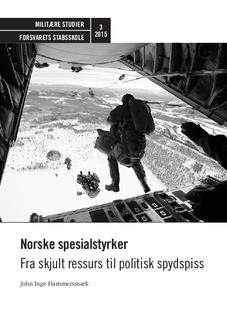Norske spesialstyrker: Fra skjult ressurs til politisk spydspiss
Others

Åpne
Permanent lenke
http://hdl.handle.net/11250/284450Utgivelsesdato
2015Metadata
Vis full innførselSamlinger
- Militære studier [18]
Sammendrag
This thesis analyses the evolution of Norway’s Special Operations Forces (SOF) from 1998 to 2010, paying particular attention to NORASOC, the Norwegian Army Special Operations Commando (FSK, formerly FSK/HJK). Since its first international deployment to Kosovo in 1999, this unit has experienced remarkable development and growth. To explain the driving forces behind this evolution, the events are discussed along two lines: the functional perspective, that is, the military utility of SOF, and the symbolic perspective, among whose factors are political profit and alliance obligations. Of the three stages described, the initial period, from 1998 to 2001, marks the transition from national to European operations. With the employment of a full SOF squadron in support of NATO operations in Kosovo, NORASOC’s primary focus changed from domestic counterterrorist assistance to include general SOF missions. In the following years, from 2001 to 2003, the unit’s scope of action moved from Europe to Afghanistan. During the decade 2003 to 2010, continuing its mission in Afghanistan, NORASOC finally evolved into a robust SOF regiment conducting full-spectrum operations. While the symbolic effects were important to accelerate this strenghtening of Norway’s SOF capabilities, they could not adequately maintain a definitive sustained level of progress without the functional utility, particularly in international operations.